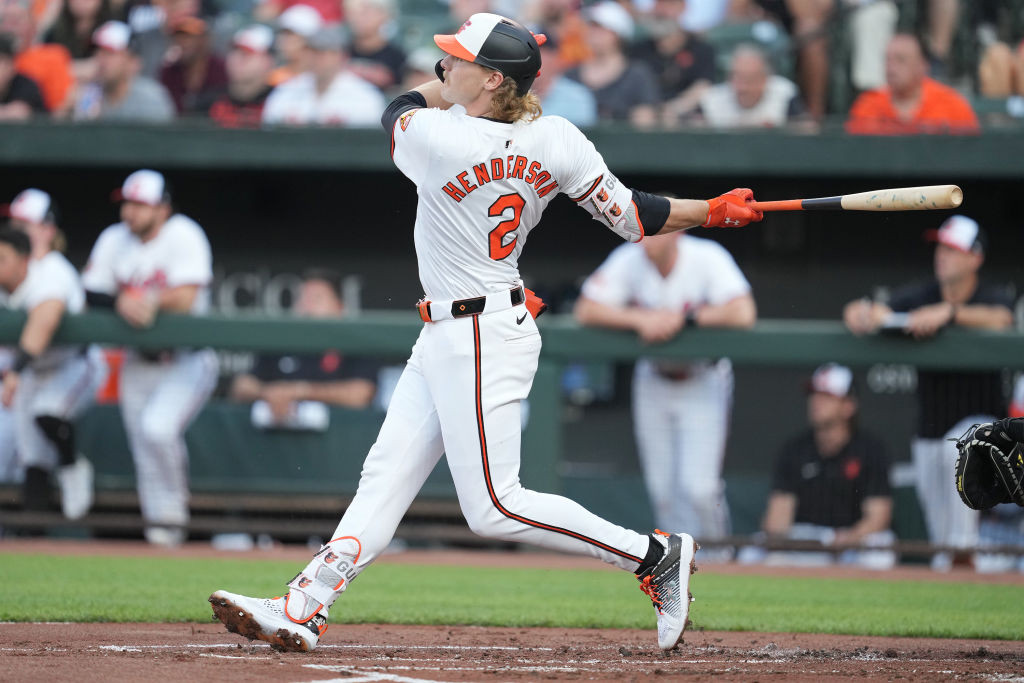Gunnar Henderson is following a tough act in the Home Run Derby.
Adley Rutschman didn’t advance past the first round last summer, but he hit 20 homers left-handed and seven more right-handed in the 30-second bonus round. Henderson will stick with the left side. Seems almost boring by comparison, but this is no time to experiment.
Rutschman brought the added storyline of playing at T-Mobile Park in Seattle, the ballpark he attended as a kid growing up in Sherwood, Oregon. And his father, Randy, pitched to him, providing a sentimental angle.
ESPN and the rest of the media ate it up. Had to loosen their belts.
Chicago’s Luis Robert Jr. moved on to the second round by hitting 28 home runs. However, a format change this year doesn’t pit two players against each other. The strict tournament style is gone.
The top four totals are what matter, with players seeded one through four in the semifinals. Unfortunately, a year too late for Rutschman.
Here are the eight participants:
Gunnar Henderson, Orioles
Pete Alonso, Mets
Alec Bohm, Phillies
Adolis García, Rangers
Teoscar Hernández, Dodgers
Marcell Ozuna, Braves
José Ramírez, Guardians
Bobby Witt Jr., Royals
The prize pool totals $2.5 million, with the winner collecting $1 million.
That'll make it feel like more than an exhibition.
Anthony Santander didn’t receive an invitation despite his 23 homers that rank second on the Orioles, but he’s a late addition to the American League team. He’ll take it.
Alonso is seeking his third title. He defeated Trey Mancini 23-22 in the finals in 2021 in Denver.
There can’t be a better story in Derby history than Mancini returning from Stage 3 colon cancer, chosen for the contest but not the All-Star Game. It felt like the world was rooting for him.
Mancini was the No. 6 seed. He got past third-seed Matt Olson 24-23 - setting the franchise record for most homers in a single round - and seventh-seed Trevor Story 13-12.
The 59 total homers are an Orioles record.
The 2004 Derby wasn’t as memorable but an Oriole won it. Shortstop Miguel Tejada was a last-minute replacement at Houston’s Minute Maid Park and set records at the time for home runs in one round (15) and overall (27).
Cal Ripken Jr. was the first Orioles player to emerge victorious in 1991 in Toronto. He also was the first player in the majors to win the Derby and be named Most Valuable Player in the All-Star Game in the same year.
Nice that he's remembered for something.
Ripken returned to the Derby the following year in San Diego, hit four homers and tied for fourth.
Mark Trumbo was the top seed in 2016 and lost to No. 5 seed and eventual champion Giancarlo Stanton 17-14 in the semifinals. No. 5 seed Manny Machado lost to No. 4 seed Joc Peterson 13-12 in the first round in 2015. A year earlier, Adam Jones totaled seven home runs in two rounds and was eliminated by Yoenis Cespedes.
Chris Davis led the majors in home runs at the break in 2013 and finished fourth with 12. Tejada participated in 2006 after declining a 2005 invitation, hit three and was ousted in the first round.
Rafael Palmeiro represented the Orioles in 2004 and finished third with 14. He placed fourth with 10 home runs in 1998.
B.J. Surhoff hit two in 1999 to tie for fifth. Brady Anderson repped the Orioles in 1996 and finished third with 11, and again in 1997, when he finished fifth with four. Mickey Tettleton hit only one in 1989, but Eric Davis and Ruben Sierra tied for first with only three.
What was happening to the baseball back then?
The inaugural Home Run Derby was held in 1985 at the Metrodome in Minnesota, and it featured Ripken and teammate Eddie Murray. Murray tied for second with four, and Ripken was last in the 10-player field with one.
Seriously, was the baseball made of cork instead of the bats? Somebody help me out here.
By accepting you will be accessing a service provided by a third-party external to https://www.masnsports.com/





